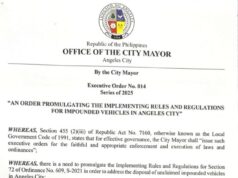Her name was Rose and she was already in her 80s. Despite her age, she went to college to get a degree. Almost all of her classmates were young. She had the experience which most of them didn’t have.
It took just a month or so for her classmates to like her. One student described her as “a wrinkled, little old lady beaming up at me with a smile that lit up her entire being.” With such charisma, she became a friend to almost everyone.
Over the course of the year, Rose became a campus icon and she easily made friends wherever she went. She even became a popular figure in the campus. The students – and some professors — were always mesmerized listening to this “time machine” as she shared her wisdom and experience with them.
At one time, Rose was invited to be a guest speaker of an athletic event. She was introduced and stepped up to the podium. She looked at everyone and started talking: “We do not stop playing because we are old; we grow old because we stop playing.
“There are only four secrets to staying young, being happy, and achieving success. You have to laugh and find humor every day. You’ve got to have a dream. When you lose your dreams, you die. We have so many people walking around who are dead and don’t even know it!
“There is a huge difference between growing older and growing up. If you are nineteen years old and lie in bed for one full year and don’t do one productive thing, you will turn twenty years old. If I am eighty-one years old and stay in bed for a year and never do anything I will turn eighty-two. Anybody can grow older. That doesn’t take any talent or ability. The idea is to grow up by always finding opportunity in change.
“Have no regrets. The elderly usually don’t have regrets for what we did, but rather for things we did not do. The only people who fear death are those with regrets.”
Years passed and Rose finished the college degree she had begun all those years ago. But one week after graduation, she died peacefully in her sleep. Over two thousand college students attended her funeral in tribute to the wonderful woman who taught by example that it’s never too late to be all you can possibly be.
Don’t be harsh to yourself if you commit a mistake. “Making mistakes isn’t stupid,” Joseph Gancher once said. “Disregarding them is.” Or as Harold J. Smith puts it, “More people would learn from their mistakes if they weren’t so busy denying them.”
Experience – including committing mistakes – is the best teacher. We must not overlook the untold benefits that can be derived from mistakes. A person should never hesitate to own he has been in the wrong, which is but saying in other words that he is wiser today than he was yesterday, because of his mistake.
Cicero, the sage man, has enumerated at least six mistakes of man. These are: (1) the delusion that personal gain is made by crushing others; (2) the tendency to worry things that cannot be changed or corrected; (3) insisting that a thing is impossible because we cannot accomplish it; (4) refusing to set aside trivial preferences; (5) neglecting development and refinement of the mind, and not acquiring the habit of reading and study; and (6) attempting to compel others to believe and live as we do.
“No matter what mistakes you may have made – no matter how you’ve messed things up – you still can make a new beginning. The person who fully realizes this suffers less from the shock and pain of failure and sooner gets off to a new beginning,” reminds Norman Vincent Peale.
Live life to the fullest! Don’t be miserable. But more often than not, we do the opposite. We use “I” as often as possible. We are always sensitive to slights. We get jealous and envious. We think only of ourselves and talk only about ourselves. We do as little as possible for others.
There are several other things that can make you miserable. Trust no one. Never forget a criticism. Always expect to be appreciated. Be suspicious. Listen greedily to what others say of you. Always look for faults in others.
Shrink your duties if you can. Never forget a service you may have rendered to others. Sulk if people aren’t grateful for your favors. Insist on consideration and respect. Demand agreement with your own views on everything. Always look for a good time. Be selfish at all times.
Instead of feeling miserable, why don’t you give love? A noted doctor has listed several emotions which produce disease in human beings. Heading the list is fear, followed by frustration, rage, resentment, hatred, jealousy, envy, self-centeredness, and ambition. The one and only antidote that can save men – and women – from these, he says, is love.
“What does love look like?” asked St. Augustine. “It has the hands to help others. It has the feet to hasten to the poor and needy. It has eyes to see misery and want. It has the ears to hear the sighs and sorrows of men. That is what love looks like.”
“We need to be loved and we need to give love,” said G.H. Montgomery. “When we are thwarted in this, we suffer terribly.” When asked what love is, Frank Tyger replied: “In tennis, nothing; in life, everything.”
J. Richard Sneed described life in one of four ways: as a journey, as a battle, as a pilgrimage, and as a race. “Select your own metaphor,” he said, “but the finishing necessity is all the same. For if life is a journey, it must be completed. If life is a battle, it must be finished. If life is a pilgrimage, it must be concluded. And if it is a race, it must be won.”
For comments, write me at henrytacio@gmail.com
It took just a month or so for her classmates to like her. One student described her as “a wrinkled, little old lady beaming up at me with a smile that lit up her entire being.” With such charisma, she became a friend to almost everyone.
Over the course of the year, Rose became a campus icon and she easily made friends wherever she went. She even became a popular figure in the campus. The students – and some professors — were always mesmerized listening to this “time machine” as she shared her wisdom and experience with them.
At one time, Rose was invited to be a guest speaker of an athletic event. She was introduced and stepped up to the podium. She looked at everyone and started talking: “We do not stop playing because we are old; we grow old because we stop playing.
“There are only four secrets to staying young, being happy, and achieving success. You have to laugh and find humor every day. You’ve got to have a dream. When you lose your dreams, you die. We have so many people walking around who are dead and don’t even know it!
“There is a huge difference between growing older and growing up. If you are nineteen years old and lie in bed for one full year and don’t do one productive thing, you will turn twenty years old. If I am eighty-one years old and stay in bed for a year and never do anything I will turn eighty-two. Anybody can grow older. That doesn’t take any talent or ability. The idea is to grow up by always finding opportunity in change.
“Have no regrets. The elderly usually don’t have regrets for what we did, but rather for things we did not do. The only people who fear death are those with regrets.”
Years passed and Rose finished the college degree she had begun all those years ago. But one week after graduation, she died peacefully in her sleep. Over two thousand college students attended her funeral in tribute to the wonderful woman who taught by example that it’s never too late to be all you can possibly be.
Don’t be harsh to yourself if you commit a mistake. “Making mistakes isn’t stupid,” Joseph Gancher once said. “Disregarding them is.” Or as Harold J. Smith puts it, “More people would learn from their mistakes if they weren’t so busy denying them.”
Experience – including committing mistakes – is the best teacher. We must not overlook the untold benefits that can be derived from mistakes. A person should never hesitate to own he has been in the wrong, which is but saying in other words that he is wiser today than he was yesterday, because of his mistake.
Cicero, the sage man, has enumerated at least six mistakes of man. These are: (1) the delusion that personal gain is made by crushing others; (2) the tendency to worry things that cannot be changed or corrected; (3) insisting that a thing is impossible because we cannot accomplish it; (4) refusing to set aside trivial preferences; (5) neglecting development and refinement of the mind, and not acquiring the habit of reading and study; and (6) attempting to compel others to believe and live as we do.
“No matter what mistakes you may have made – no matter how you’ve messed things up – you still can make a new beginning. The person who fully realizes this suffers less from the shock and pain of failure and sooner gets off to a new beginning,” reminds Norman Vincent Peale.
Live life to the fullest! Don’t be miserable. But more often than not, we do the opposite. We use “I” as often as possible. We are always sensitive to slights. We get jealous and envious. We think only of ourselves and talk only about ourselves. We do as little as possible for others.
There are several other things that can make you miserable. Trust no one. Never forget a criticism. Always expect to be appreciated. Be suspicious. Listen greedily to what others say of you. Always look for faults in others.
Shrink your duties if you can. Never forget a service you may have rendered to others. Sulk if people aren’t grateful for your favors. Insist on consideration and respect. Demand agreement with your own views on everything. Always look for a good time. Be selfish at all times.
Instead of feeling miserable, why don’t you give love? A noted doctor has listed several emotions which produce disease in human beings. Heading the list is fear, followed by frustration, rage, resentment, hatred, jealousy, envy, self-centeredness, and ambition. The one and only antidote that can save men – and women – from these, he says, is love.
“What does love look like?” asked St. Augustine. “It has the hands to help others. It has the feet to hasten to the poor and needy. It has eyes to see misery and want. It has the ears to hear the sighs and sorrows of men. That is what love looks like.”
“We need to be loved and we need to give love,” said G.H. Montgomery. “When we are thwarted in this, we suffer terribly.” When asked what love is, Frank Tyger replied: “In tennis, nothing; in life, everything.”
J. Richard Sneed described life in one of four ways: as a journey, as a battle, as a pilgrimage, and as a race. “Select your own metaphor,” he said, “but the finishing necessity is all the same. For if life is a journey, it must be completed. If life is a battle, it must be finished. If life is a pilgrimage, it must be concluded. And if it is a race, it must be won.”
For comments, write me at henrytacio@gmail.com



